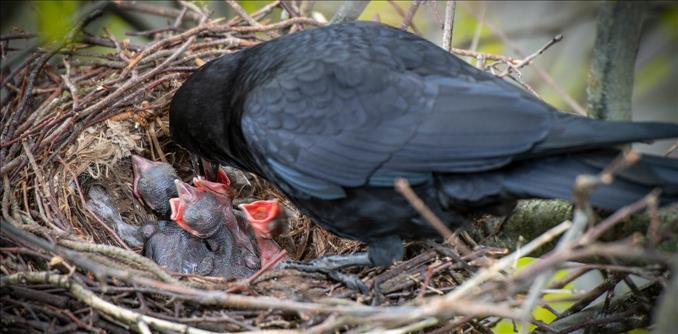(MENAFN- The Conversation) large brains are a hallmark of human evolution . Brains allow us to make sense of the world and to successfully navigate through our lives.
bigger brains are valuable because they provide increased flexibility to deal with everyday problems , allowing them to make better decisions, learn difficult skills and innovate solutions to challenging problems .
Large brains evolved in mammals and birds independently . The related increased intelligence provides an advantage to animals when it comes to their daily lives. For example, animals with larger brains are more likely to succeed in urban areas or when released in new habitats .
Brain power
Brains require a continuous supply of energy, and thinking hard requires additional energy consumption. Thus, brains that are comparatively large in relation to body size are energetically costly to maintain .
Brain development is an energy-intensive process , posing a paradox for brain growth in young animals and birds: how can young animals fuel the growth of their large brains before they are skilled enough to obtain enough calories?
Maybe their parents pay for it, as is the case for our species, where parents work to support children's growth and development.
my colleagues and i compared brain sizes of 1,176 bird species , representing approximately 10 per cent of all bird species worldwide. We found species that spend more resources on their young have larger brains as adults.
In other words, parents support the brain growth of their young. This allows young animals to overcome the otherwise insurmountable challenge of growing their large brains.
Distribution of brain size across 1,176 bird species. (Michael Griesser and Szymon M. Drobniak), Author provided Egg yolks contain the energy needed for young birds to develop until they hatch. Parent birds also transfer warmth while incubating their eggs and their young after they hatch. Some bird species provide even more resources by feeding their young after they hatch.
Species that lay large eggs for their body size, such as chickens, often do not feed their young once they hatch . Consequently, adults of these species end up with small brains.
Parents that feed their young after they hatch prolong the amount of time in which their young can grow their brain, and end up with larger-brained and more intelligent young.
Clever and caring
Despite that birds have small brains in absolute terms, which is an adaptation linked to flight, crows, parrots and owls are reputed to be very clever . Corvids, which includes crows, ravens and jays, are not only clever , they are also caring.
About 80 per cent of corvids live in family groups and about 44 per cent breed co-operatively , where other family members help with feeding the young. New Caledonian crows are one of the brainiest bird species, and parents feed their young for up to two years .
Some birds, like chickens and ducks, do not feed their young. (M. Warrington), Author provided Climate change and brain size
As global warming causes local climate changes, it will affect the amount of food that is available for birds and other animals. For example, in grasslands, lower rainfall reduces the amount of grass seeds , an important food source for birds and rodents.
Animals living in hot, dry habitats - such as Cape ground squirrels in South Africa - may push the limits of their ability to tolerate heat in hotter daytime temperatures . Having less food and more heat stress may then result in population declines as animals die or fail to reproduce.
In contrast, for animals living in cold habitats, like the Siberian jays living in the Arctic, warmer temperatures may have negative impacts. Siberian jays store food to survive winter , but during warmer winters with less snow, food stores may not remain frozen and could rot. This may lead to starvation, as shown in canada jays .
Warmer temperatures caused by climate change may spoil the food that Siberian jays store to survive winter. (M. Griesser), Author provided However, Siberian jays are clever birds with large brains. Their large brain may be their lifeline when dealing with the effects of climate change. In general, large-brained animals may be able to quickly adapt by flexibly changing what and how they eat .
If changing environments compromise an animal's ability to obtain enough food to fuel their own brains and provide enough food for the brain development of their young, then a world of smaller-brained animals may prove to be another negative effect of climate change.




















Comments
No comment